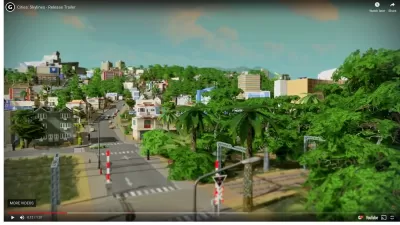The continued improvement of digital technology should benefit evidence-based policy and decision-making. Welcome to a new era of planning simulations.

Laura Adler surveys the world of data-driven simulations in the field of planning. Simulations have been a part of planning practice for decades, as Adler notes, but recent improvements in data collection and computing power empower planners in new and constantly evolving ways.
Adler surveys the latest in technology, grouping the state of the art in simulation into two groups:
Comprehensive Models
- UrbanSim, founded by University of California, Berkeley Professor Paul Waddell, "allows users to run simulations, draw from a library of open data, and produce visualizations."
- MIT's Changing Places initiative has developed CityScope, "an urban simulation tool that integrates physical representation—using Legos—with projections and visualization tools."
- Participatory Chinatown, from Emerson College, "used a multiplayer game format to engage citizens in a number of simulated neighborhood activities inside a digital recreation of Boston’s Chinatown."
Specific Systems
- The "urban intelligence network," or AURIN, from Australia, "is a state-run resource for the nation’s cities and towns that provides datasets and online tools for analysis, modeling, and visualization."
- "In Chicago, the Metropolitan Planning Council developed the TOD Calculator (for Transit Oriented Development) to help residents learn about the economic and sustainability benefits of potential TOD sites."
- Arizona State University researchers developed the Phoenix WaterSim "to help the Phoenix metropolitan government estimate supply and demand in order to effectively manage its limited resources."
The survey includes more examples of each variety. Also included in the article are simple descriptions of the benefits of simulation, including the ability to anticipate and mitigate unintended consequences and to bridge gaps of representation in the planning process.
FULL STORY: SimCities: Can City Planning Mistakes Be Avoided Through Data-Driven Simulations?

Maui's Vacation Rental Debate Turns Ugly
Verbal attacks, misinformation campaigns and fistfights plague a high-stakes debate to convert thousands of vacation rentals into long-term housing.

Planetizen Federal Action Tracker
A weekly monitor of how Trump’s orders and actions are impacting planners and planning in America.

Chicago’s Ghost Rails
Just beneath the surface of the modern city lie the remnants of its expansive early 20th-century streetcar system.

Bend, Oregon Zoning Reforms Prioritize Small-Scale Housing
The city altered its zoning code to allow multi-family housing and eliminated parking mandates citywide.

Amtrak Cutting Jobs, Funding to High-Speed Rail
The agency plans to cut 10 percent of its workforce and has confirmed it will not fund new high-speed rail projects.

LA Denies Basic Services to Unhoused Residents
The city has repeatedly failed to respond to requests for trash pickup at encampment sites, and eliminated a program that provided mobile showers and toilets.
Urban Design for Planners 1: Software Tools
This six-course series explores essential urban design concepts using open source software and equips planners with the tools they need to participate fully in the urban design process.
Planning for Universal Design
Learn the tools for implementing Universal Design in planning regulations.
planning NEXT
Appalachian Highlands Housing Partners
Mpact (founded as Rail~Volution)
City of Camden Redevelopment Agency
City of Astoria
City of Portland
City of Laramie





























